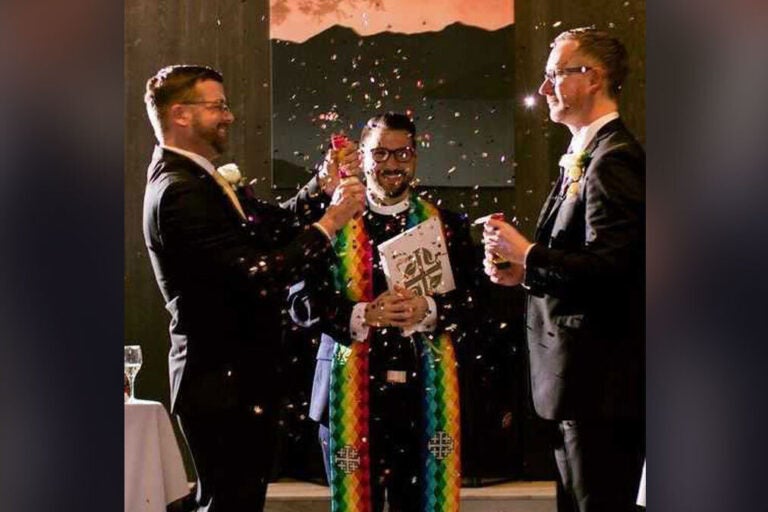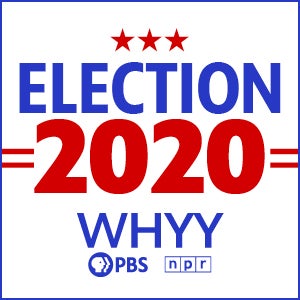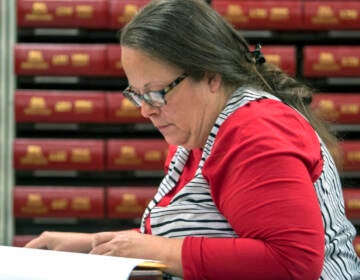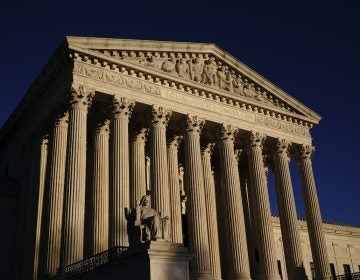LGBTQ community relieved at Biden win, but worry SCOTUS could jeopardize rights
While members of the LGBTQ community are relieved at Joe Biden’s win, there’s still concern the new-look Supreme Court could threaten their rights.
Listen 2:19
Rev. Fritz Fowler (center) marries Ted Sayland (left) and Rusty McCarty (right) in 2018. (Courtesy of Abigail Townsend Photography)
Christian Williams and Gianfranco Rizzo had a whirlwind romance.
After meeting in January, the Newark, Del. couple moved in together during the height of the pandemic. Quarantine brought them closer together, and over the summer the pair discussed their future, and planned to marry in 2021.
But the Trump administration’s anti-LGBTQ and anti-immigration policies scared the young couple. Rizzo, an international student from Honduras, said the nomination and confirmation of Supreme Court Justice Amy Coney Barrett, and the undermining of marriage equality by two other conservative justices, was the icing on the cake that made their marriage crucial.
“When I read that, it’s like, ‘We just got our rights passed, and they’re on the line.’ Even with the presidential elections, it was a lot of stress to the point where it was very hard to function the last couple of weeks,” Rizzo said.
So the pair intentionally set their wedding date before the presidential election — on Oct. 31.
“We wanted to do it as quickly as possible in a sense to prove we have our rights, and we can do whatever we’re willing to do to secure that we want to be together and that we deserve to be together,” Rizzo said. “And someone who is against that, I don’t think it should be any of their business, because most of the claims are based on religion … I don’t think you can push your religious agenda against anyone. It came down to, in a sense, and I don’t want to sound too vulgar, but a middle finger to this idea that we can’t get married.”

During the confirmation process for Supreme Court Justice Amy Coney Barrett, and after two justices attacked the court’s 2015 decision to declare gay marriage constitutional, many members of the LGBTQ community feared their rights could be taken away.
After the Supreme Court last month declined to hear a case brought by former Kentucky county clerk Kim Davis, who refused to issue marriage licenses to LGBTQ couples, Justices Clarence Thomas and Samuel Alito used the moment to criticize the court’s 2015 decision on marriage equality.
On behalf of himself and Alito, Thomas wrote the decision “enables courts and governments to brand religious adherents who believe that marriage is between one man and one woman as bigots, making their religious liberty concerns that much easier to dismiss,” and that Davis “may have been one of the first victims of this court’s cavalier treatment of religion in its Obergefell decision.”
Barrett also has been criticized for her religious views and for her opinions on LGBTQ issues. According to the Associated Press, Barrett served on the board of private Christian schools that effectively barred admission to children of same-sex parents and that do not support openly gay and lesbian teachers.
She also was mentored by Justice Antonin Scalia, who dissented in the Supreme Court’s 2015 decision on gay marriage. During her hearings, Barrett did not answer questions to reassure the LGBTQ community she would support gay rights.
There’s currently a case in the Supreme Court about a Philadelphia adoption agency that wants to turn away same-sex couples. It’s the first major dispute to come before Barrett.
Rev. Jason Churchill of St. Stephen’s Lutheran Church in Wilmington, Del. posted a Facebook status on Oct. 27 offering immediate same-sex marriages just in case marriage equality is struck down.
“The church’s mission is to reach out to people who have been marginalized by the church throughout history, so we feel it’s one of our most sacred duties to be able to reach out to those who are otherwise excluded by other denominations and by other Christians, and show that there is a story of love and compassion and equality within our faith,” said Churchill, who is his church’s first openly gay pastor.
“No matter what the Supreme Court says, or the state of Delaware says, I will, and most clergy that are of the same mindset as I am, we will continue to perform weddings, and we will not cave to any social or political agendas that tell us we cannot do that,” Churchill added. “Decades before marriage equality, there have been pastors in the Lutheran tradition that have married people when it was not legal, and we will continue to do so if that right is taken away.”

One couple, Laura Logeman and Dara Nigreville of Wilmington, Del., has taken Churchill up on his offer after being introduced by a mutual friend. The pair were originally planning on getting married in October 2022, but after the death of Justice Ruth Bader Ginsburg and watching the Barrett hearings, the couple decided to be married by Churchill in December of this year.
“It was towards Election Day, there was rumors the Supreme Court was going to put a gay marriage case on the docket for review. We decided, not knowing Biden would win, we don’t want to wait. Even if he did win, is there a Supreme Court that would overrule that decision?” Logeman said.
“It’s been a lot of different feelings, especially toward the beginning. There was a lot of hurt and anger and frustration, it doesn’t feel right, it’s not what we talked about … I think we felt cheated out of that experience because we’re rushing through to get it done and no one will be there except for my brother and his wife and two of our friends,” she said.
“But the more we started planning, the negative feelings turned to positive because we did receive such a positive reaction from our close friends and Jason [Churchill.] The people who reached out to us that had nothing but support and love made it so much easier.”
When President Donald Trump was elected four years ago, Rev. Fritz E. Fowler of University Lutheran Church in Philadelphia informed the public that he would marry same-sex couples, fearing what might happen during a Trump/Pence administration.
Fritz, who is gay, republished his 2016 message last month, encouraging those who want to marry sooner rather than later to contact him because of the conservative Supreme Court.
“I think it’s important to know there are over 1,100 different provisions in which marital status is a factor, especially when it comes to determining benefits, determining rights and privileges. And when same-sex marriage became legal in 2015, those benefits became available to same-sex couples,” he said.
“As a faith leader and openly gay man, I felt a lot of fear. I feared for my friends, and I feared for other members of our community,” Fritz added. “We have fought for decades, and perhaps even centuries, to be recognized as deserving as the same rights heterosexual couples benefit from, and I don’t want to see those reversed. I don’t want to see us take a step back as a country, but rather, take steps forward.”
Many members of the LGBTQ community say they feel relieved that Biden won the election.
Nationally, the Trump administration rolled back LGBTQ rights, especially those for transgender people, including eliminating an Obama-era regulation prohibiting discrimination in health care against patients who are trans, banning trans people from the military, and upending previous Department of Justice interpretations of the Civil Rights Act that protect trans and non-binary workers from employment discrimination.
The State Department also began to refuse visas for the partners of some LGBTQ diplomats and UN workers if they weren’t married. The Trump administration also proposed allowing federal funds to flow to adoption agencies that refuse to place children with LGBTQ families.
Ted Sayland and Rusty McCarty of Collingswood, NJ, got engaged in 2016 and married in 2018, earlier than originally planned, because they feared a Trump administration might ban marriage equality before they were able to get hitched.
“It was, ‘Let’s get it in before we know he’s going to overturn it,’” Sayland said. “There’s always been that fear and certainly going into the 2020 presidential race that was the main reason why we were Biden supporters. Marriage equality was always the biggest thing for us because we knew that would change everything.”
When he heard about the Barrett nomination his first reaction was “dread.”
“The biggest fear was that there was another person on the justice team that is very conservative, and could have an opportunity to switch things back,” Sayland said, pointing to the importance of the legal protection rights to protect each other when it comes to health, welfare and financial wellbeing.
Biden, who spoke in favor of gay marriage in 2012, has promised to reaffirm the LGBTQ rights policies that Trump eliminated.
“A lot of trans folks are dying because of transphobia, because of rhetoric you hear from the Trump administration and supporters of his agenda,” Churchill said. “And I think it’s important to remember [Biden] was one of the people of his generation to come out early in support of the gay community … So we have a strong ally. And the same with Vice President-elect Harris. She’s also been a champion of LGBTQ folks in California, so there’s a lot to be hopeful for.”
Rizzo and Williams agree.
“I feel much more at ease with a Biden administration because ultimately I feel like our executive branch of government set the tone for the country when it comes to acceptance or not,” Williams said. “I think that Biden has made it pretty clear we were part of his campaign as a group and a focus of his campaign and that he wants us to be represented, and so I feel like a weight has been lifted off my shoulder.”
But he and others in the LGBTQ community warn that more work needs to be done.
“We also recognize the president doesn’t have all the power; the House and Senate does. There’s still a lot of conservative mindsets that control the House and Senate as well as the ears of wealthy powerful people. Until we have that change in mindset, there will always be some trepidation we have towards being treated differently than any other for simple basic rights,” Sayland said.
Rizzo and Williams say despite getting married sooner than expected, their wedding was just as special as if they had waited for a large ceremony next year.
“The moment was still very special because when I looked at him in that moment in front of our very close family and friends it was very intimate and it was kind of like a melding of families, chosen and otherwise,” Williams said. “So I think there was still a poignance and a specialness to it, because we knew the conversation that had taken to get to that point and I knew ultimately we were doing it because I love him and want to make sure he stays with me and we’re able to build something,” Williams said.
Rizzo agrees.
“There isn’t really a rule book on how to be a gay person or how to be queer, it’s something you discover yourself, it’s something you learn through your community, and at the end of the day, if I have the right to get married I will, we don’t need to be all showy, especially in times like this. We can celebrate and have something memorable, but we don’t have to flaunt anything. I don’t have to flaunt my love for him, I know I love him.”

Get daily updates from WHYY News!
WHYY is your source for fact-based, in-depth journalism and information. As a nonprofit organization, we rely on financial support from readers like you. Please give today.







